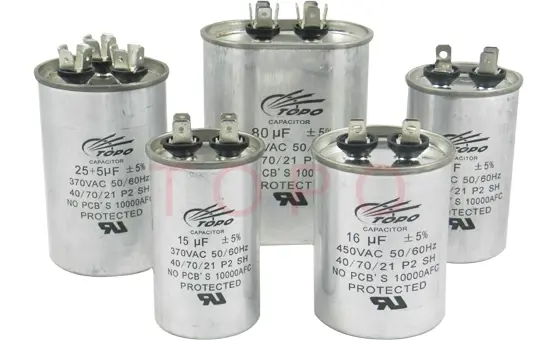
What is a Capacitor and Why Do They Break on Air Conditioners?
Living in the warmer climates presents many challenges, but none are so difficult to overcome as the intense, furnace-like heat of the summer. Fortunately, modern air conditioners are constructed with just a few parts, which makes them incredibly reliable. You can count on your unit to keep on trucking for years and years with very little maintenance, but if your air conditioner suddenly refuses to start up one day despite your best care, the capacitor is probably to blame. Though small, capacitors play a big role in your air conditioner's daily functioning.
What is a Capacitor?
A capacitor is a clever device composed of two metal conductors separated by an insulating material. On an air conditioner, they often look like large, cylindrical batteries with two or three posts sticking out of the top. The main job of capacitors is to store electrons to provide start-up energy for your air conditioner, they build up a charge when electricity runs through them by swapping electrons between the two conductive plates inside.
Because of their capacitors, air conditioners do a little magic trick every time they start up. Your A/C unit actually requires a great deal more start-up energy than is available through your home's wiring, so the capacitor is added to the circuit to give an electrical jumpstart at the same moment that your air conditioner is drawing power from the electrical grid. Together, these two electrical sources provide the right amount of juice to your air conditioner. The capacitor's job is over until an air conditioning cycle is complete. Then the compressor must start up again.
Your air conditioner may actually contain several different capacitors, including the compressor motor run capacitor, the outside fan motor run capacitor, the indoor fan motor run capacitor and the start capacitor. The most common capacitor to fail is the compressor motor run capacitor. It has a big job, and an even bigger footprint in your air conditioner. It's actually a dual capacitor, with three terminals instead of just two.
Why Good Capacitors Go Bad
Capacitors fail every day — they do a tough job and, unfortunately, their work takes a toll. There are a few factors that play heavily into the lifespan of your capacitors, though. These include:
Heat exposure. In Texas, perhaps one of the most damaging elements for air conditioner capacitors is the heat. Unfortunately, exposing these units to high heat for extended periods greatly shortens their lives and can cause significant damage to your unit. Make sure you shade your air conditioner. Keep it clean and the air circulating to maximize your capacitor's lifespan.
Voltage rating. All capacitors have a voltage rating, which informs air conditioner technicians exactly which capacitor matches which air conditioner. Unfortunately, homeowners may try to cut costs by choosing to replace their capacitor themselves without understanding how to choose the right capacitor. An undersized capacitor won't hurt your air conditioner, but it will shorten the capacitor's life significantly. If you decide to DIY this job, remember that bigger is better — if your air conditioner is a 370- volt unit, bumping up to a 400-volt capacitor will ensure you get enough power and that your capacitor comes closer to reaching its maximum life span.
Age. Like all things, capacitors have a limited life span. Most are designed to last approximately 20 years, but a number of factors can cause them to wear out more quickly. If your air conditioner cycles much more rapidly than average, your capacitor is undersized (as mentioned above) or it's built from problematic parts, and the estimated life span may be greatly reduced. Fortunately, these parts are relatively inexpensive to have replaced, so even if your capacitor wears out before your air conditioner does, it won't break the bank.
If your air conditioner is refusing to start, running with little enthusiasm, making weird noises or just isn't cooling right, give All Pro AC a call. All of our technicians are trained to handle any sort of problem your air conditioner can throw at them.
The post What is a Capacitor and Why Do They Break on Air Conditioners? appeared first on All Pro A/C.